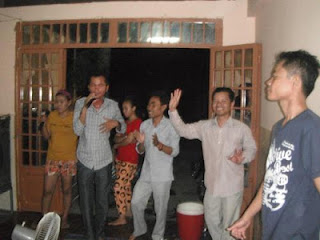A couple months ago I posted my thoughts on how the Peace Corps experience changes and challenges every volunteer, and it received a fair amount of responses, including not-so-flattering reviews and criticisms.
One commentator (whose comment no longer appears) took umbrage with this particular passage of mine:
You will be the biggest product of your Peace Corps work. You will change. And you will bring that change back with you.
(The full post can be found at http://mylifewithrice.blogspot.com/2013/05/an-open-letter.html.)
Since I can no longer access the original comment, my memory’s paraphrase shall have to suffice:
This post demonstrates exactly what is wrong with the Peace Corps, and the author even admits it! It’s all about the person’s own benefits, and not about helping others at all.
Peace Corps has three main goals, and I suppose the latter two could be viewed as self-serving as they focus on cultural exchange. That viewpoint, though, I believe is vastly cynical due to its shortsighted nature.
I recently participated with other K5s (the 5th generation of volunteers in Cambodia) in our Close of Service Conference, where I was touched by the final remarks of our Country Director, Penny Fields. Penny was serving as a volunteer in Gabon when the Gulf War broke out. As she told us, her thoughts upon hearing of the war were of the people in her village: What if it had been here? Her political leanings and voting record have been perpetually guided by that moment of viewing the world from another country’s citizens’ perspective.
So maybe it’s true; maybe Peace Corps is a cultural exchange program and not a development one. But to claim that it’s selfish and won’t help those in other countries is ignorant of the development work done directly or indirectly by Returned Peace Corps Volunteers because of those ‘self-serving’ results.
Here are some ways that my time in Cambodia has affected me and will continue to do so in how I vote and for what I advocate and how I work:
* I have a very hands on experience with my food here. Most vegetables in my village are grown locally, and the fruit I get from the trees in the yard. Meat is bought fresh and eaten that day. I know our eggs are fresh, because we’ll take them straight from our ducks’ roost. We don’t have a fridge and our ice supply isn’t reliable. Meals are prepared and eaten in quick succession. Apart from the occasional stomach mishap, I’m healthier here in large part to the composition of my diet. I won’t be looking at supermarkets and preservatives and importation the same way upon returning to the States.
* My province houses several different factories belonging to international companies. Many of my students will drop out of school if they have the opportunity to get a job at one of these factories. Last year, workers were fired upon during a strike for better wages. This week, two factories around Phnom Penh collapsed, killing and injuring workers. There’s been a long-term protest outside a Phnom Penh factory because large, well-known multinational companies are refusing to pay wages due. The average factory worker earns a decent salary by Cambodian standards. Ask me in a few years how I’m voting in regards to outsourcing.
* Lately, I’ve been a frequent recipient of the Cambodian health care system. Health care here is unbelievably cheap by American standards, but the quality is usually in doubt. Health insurance is either incredibly rare or nonexistent. Families will go into debt for emergency care. My host mother has foregone receiving medical attention for a long ailing stomach condition and even getting a pair of glasses because of the expense. My future earnings will be going in part to international medical outreaches and my effort toward making sure Americans aren’t also having to forgo needed care because of the cost. In conversation with my host aunt about America’s wealth gap, she expressed surprise that a country with citizens still struggling to meet basic needs is advising others on poverty policy. I’ve taken that to heart.
These are just three brief ways among several in which my notions have been challenged by living abroad and viewing life from a small village in rural Cambodia. These changes will affect how I view domestic and foreign policy for the rest of my life. I’m bringing those changes home with me, and they’ll be sent right back out in the form of my votes and activism. I’d wager that in the long run Returned Peace Corps Volunteers have multiplied the affect of their service on the host country nationals’ lives through their actions post-service.
I’d love to hear from others about their own countries of service and how they’ve changed as global citizens because of their time there. How were you a product of Peace Corps service?

















